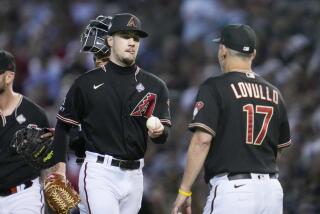Soaking its customers
- Share via
FROM PHILADELPHIA — It’s Game 5 of the Stanley Cup finals, with the home team one victory from the championship. The freezing coils break down, the ice turns to slush and players skate through puddles.
We know what Bud Selig would say if he were running the NHL: Game on!
This has been a World Series marked by bad calls, not just by the umpires but by the lords of the sport. After forcing fans to endure hours in the rain Saturday night to wait for a game that did not end until Sunday morning, Selig and Co. jeopardized the integrity of the game and the health of its players by waiting far too long to call a rain delay on Monday.
“Of course,” Philadelphia Phillies pitcher Cole Hamels said. “When you hurt a million-dollar athlete, that’s trouble, for the team and for Major League Baseball.”
The game ultimately was suspended, not as soon as the rain turned heavy in the fourth inning, but as soon as the Tampa Bay Rays tied the score in the sixth inning.
The Rays would not have lost the World Series had the game been stopped after five innings, when the Philadelphia Phillies led, but even the players did not know that until Selig said so, after the game.
We’ll play again here, maybe tonight, maybe Wednesday. We’ll pick up Game 5 with the score tied, 2-2, and the Phillies coming to bat in the bottom of the sixth inning. The Phillies lead the series, three games to one.
No one was injured, and for that Selig can thank his lucky stars. And, in fairness to Selig, he was unlucky.
At 7:45 p.m. -- 45 minutes before game time -- he said he got a forecast that called for light rain until midnight, a total of about one-tenth of an inch. Game on.
In the fourth inning came the deluge. In the stands, out came the rain slickers, ponchos and plastic trash bags. On the field, out came the groundskeepers, pouring bags of dirt in an increasingly futile attempt to plug the puddles on the mound, at the plate, and along the bases.
Selig said he descended to field level in the fourth inning, so he could consult with the umpires and grounds crew. He kept hearing the field was playable, but he should have trusted his own two eyes. We can’t blame him for listening, but common sense should have prevailed, and the game should have been stopped immediately.
“When the wind turned around and started coming in from right field is when you started to see where players had trouble catching the ball, and now the game runs the risk of being comical,” umpire Tim Tschida said. “We never reached that point.”
Sure we did, in the fifth inning, when Phillies shortstop Jimmy Rollins lost a routine pop fly in the rain and wind. It was later in that very inning, after all, when Tschida said he did not invoke the infield fly rule on another pop fly because the conditions made it difficult to catch the ball “with ordinary effort.”
Never mind the infield. According to Tim Welke, the crew chief, “What we look for as umpires is the integrity of the mound and the batter’s box, and that was never compromised.”
The mound? “You couldn’t get good footing,” said Scott Kazmir, the Tampa Bay pitcher in the fifth inning.
The batter’s box? “I remember looking at home plate, and all I saw was water,” the Rays’ Carlos Pena said. “I didn’t even see home plate. There were puddles. . . . Those were horrible conditions.”
So much so that, when Pena singled home B.J. Upton with the tying run in the sixth inning, Upton said he had to circle wide of third base so he could run home along the grass rather than the mud path of the baseline.
In the hour between the start of the downpour and the time Selig finally gave in, Upton said he could not believe the game rolled along, with more bags of dirt unloaded between innings.
“You kind of wonder what’s going on,” Upton said. “You’re talking about guys’ careers over one game.”
Selig said he had told team executives beforehand that he would not let a shortened game stand, making the decision to play on all the sillier.
“I would not have allowed a World Series to end this way,” he said.
That would have been executive discretion, because the rules say otherwise. The players weren’t sure what would have happened, and even the notes distributed by Selig’s office after the fifth inning read, “The game is now an official game.”
Selig made the right call there. Even the Phillies, the team that had the lead after five innings, readily agreed.
“I think that would have been the worst World Series win in history,” Hamels said. “I would not pride myself on being a world champion with a win in a called game.”
So the Rays play on, and drive on. They had checked out of their hotel Monday afternoon, and they couldn’t get back in Monday night. They finally found rooms in Wilmington, Del., a long way to go on a long and rainy night.
--
More to Read
Go beyond the scoreboard
Get the latest on L.A.'s teams in the daily Sports Report newsletter.
You may occasionally receive promotional content from the Los Angeles Times.











